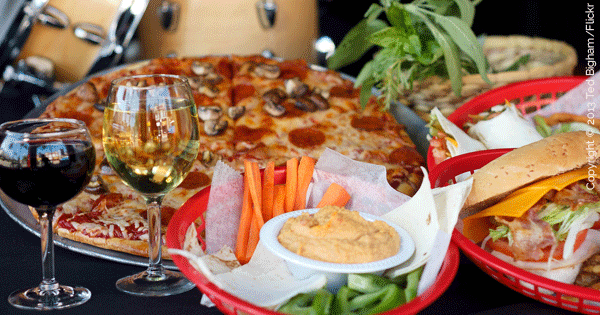Advertisement
With the holidays right around the corner, how much do you really have to eat to gain one pound in just one day?
Yahoo! Health set out to answer this question, and spoke with Samantha Cassetty, R.D., M.S., a nutrition director at Luvo.
According to Cassetty, while you might feel like you ate your weight in cake, there's no need to freak out.
“It’s virtually impossible to gain weight overnight, even if you really blew it on bar food,” says Cassetty. “The reason comes down to calorie math. Though it’s not 100 percent precise, the basic principle stands true: In order to gain weight, you’d have to eat 3,500 more calories than you typically eat and burn off to maintain your figure.”
To put that into practice, let's do some math. If you generally eat 2,000 calories a day, you would have to eat an additional 3,500 calories on top of that--that's 5,500 calories in one day. You'd have to eat four huge salads from the Cheesecake Factory, and you still might not have eaten enough--and that's just to gain one pound.
Cassetty has another example: “To get 3,500 more calories, you could eat your regular diet and then also have three glasses of wine (370 calories), two chicken wings (110 calories), some onion rings (340 calories), a portion of chips and queso (290 calories), one burger with the works (860 calories), and a slice of chocolate cake (795 calories). That’s a lot of food—and you haven’t even hit the mark yet!” Cassetty explained.
Of course, all of this is assuming that you broke you usual diet for one (bad) day. Instead of freaking out, just be sure to get right back on track the following day--no harm, no foul!
But what about holiday weekends? Binge eating commonly happens all the way from Thanksgiving to the following Monday, so that can easily cause excess weight gain, right?
A recent study shows that even during a six-week holiday period, people tend not to gain as much weight as they think they do.
“Although people typically say they gain five to 10 pounds over the six-week holiday period, the best study to date, published in the New England Journal of Medicine, found that, on average, most people gained just one,” says Cassetty. “Fewer than 10 percent of the study participants actually gained more than five pounds between Thanksgiving and New Year’s Day."
“But as long as you course correct the next day—i.e., you eat responsibly and get back to your fitness routine—you’ll keep the real pounds from piling on,” says Cassetty.
Just be sure that your bad eating days are infrequent, and it won't change your overall weight. Go ahead, have a slice of that yummy pumpkin pie! You deserve it!
What do you think about all this? Are you surprised? Let us know what you think in the comments!
Copyright © 2013 Ted Bigham/Flickr




